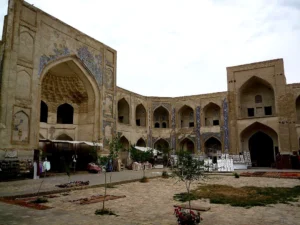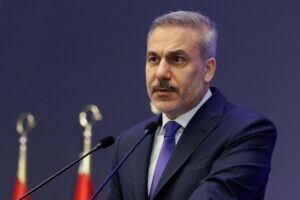Türkiye on the Fast Track to Development

Türkiye is rapidly emerging as a key player in the global economic powerhouse. From revamping its transport infrastructure to implementing export-led growth strategies, Türkiye’s progress is a testament to its vision of sustainable development and resilience. Over the years, Türkiye has pursued ambitious policies to modernize its economy, improve its transport infrastructure, and enhance its global competitiveness. As the nation embarks on its “Century of Türkiye” vision, its strategies promise to uplift economic, social, and environmental dimensions, positioning it as a model of balanced development.
A robust transport infrastructure is critical for Türkiye’s economic and social development. By facilitating the movement of goods and people, efficient transportation systems enhance business activities, attract investments, and foster regional integration. Recognizing the centrality of this sector, the nation has launched numerous projects aimed at modernizing roads, railways, and airports. These initiatives not only bridge domestic connectivity gaps but also integrate Türkiye more effectively into global trade networks. For example, the development of the Marmaray railway project and new highways has significantly improved trade efficiency, reducing logistical costs for exporters and boosting economic productivity.
Improving transportation also supports social cohesion by connecting remote areas to urban hubs, enabling equitable access to education, healthcare, and job opportunities. This aligns with the country’s broader developmental goals of fostering inclusivity and narrowing regional disparities.
Economic development in Türkiye’s extends beyond growth metrics; it is about improving the quality of life for its citizens. Increased income per capita, coupled with investments in education, healthcare, and public services, enhances human capital and creates a more equitable society. These advancements empower citizens with better choices and opportunities, fostering a culture of innovation and entrepreneurship. Türkiye’s developmental strategies have focused on reducing poverty, creating employment opportunities, and addressing systemic inequities. The Twelfth Development Plan (2024-2028) emphasizes sustainable growth, ensuring that the benefits of economic progress are distributed fairly across the population. Policies under this plan aim to strengthen human capital while safeguarding environmental sustainability.
Türkiye’s transition from a traditional agricultural economy to a diversified industrial and service-oriented one marks a key milestone in its development journey. While agriculture still employs a significant portion of the population, the industrial sector has become the backbone of economic growth. Investments in advanced manufacturing technologies, renewable energy, and digital infrastructure have enhanced productivity and global competitiveness. Key industries, including automotive, electronics, and petrochemicals, have flourished as part of Türkiye’s strategic economic policies. This diversification reduces reliance on imports and strengthens Türkiye’s self-sufficiency in critical sectors. Meanwhile, the services sector, particularly tourism and finance, continues to thrive, contributing substantially to GDP growth and employment.
The Twelfth Development Plan (2024–2028)
The Twelfth Development Plan (2024–2028) serves as Türkiye’s comprehensive roadmap for achieving its long-term developmental objectives. Designed within the framework of the 2053 vision, the plan encapsulates Türkiye’s aspiration to be an environmentally friendly, disaster-resilient, and technologically advanced nation with equitable income distribution and robust economic growth.
The Twelfth Development Plan is based on several key pillars.
- Stable Growth and a Strong Economy: Prioritizing fiscal stability and structural reforms to ensure sustained economic expansion.
- Competitive Production with Green and Digital Transformation: Encouraging eco-friendly practices and digital innovation to enhance productivity and global competitiveness.
- Qualified Human Capital and a Healthy Society: Focusing on education, healthcare, and family welfare to build a skilled and healthy population.
- Disaster-Resilient Living Spaces and Sustainable Environment: Investing in resilient infrastructure to mitigate risks from natural disasters.
- Democratic Governance and Justice: Strengthening institutional frameworks to promote transparency, accountability, and inclusivity.
This ambitious plan highlights the importance of digital transformation, with a dedicated focus on “digital government” to improve citizen engagement and service delivery. Country commitment to stabilizing its economy while ensuring social welfare has earned global recognition. For instance, Treasury and Finance Minister Mehmet Şimşek’s policies have focused on balancing growth with macroeconomic stability. The improved risk premium and increased foreign exchange inflows are testaments to the international community’s confidence in Türkiye’s economic management.
Sustainability and Green Growth
Sustainability lies at the heart of a nation’s developmental vision. The Twelfth Development Plan incorporates ambitious goals for green transformation, including investments in renewable energy, sustainable agriculture, and eco-friendly urban planning. These efforts not only address climate change but also create new economic opportunities in emerging sectors like clean energy and green technologies. Its focus on sustainability aligns with global efforts to combat environmental challenges, enhancing its reputation as a responsible global citizen. Initiatives like expanding wind and solar energy capacity demonstrate Türkiye ’s commitment to reducing its carbon footprint while ensuring energy security.
Conclusion
Türkiye’s fast-paced development is a story of ambition, resilience, and innovation. By addressing infrastructure challenges, diversifying its economy, and embracing sustainability, the nation has set a robust foundation for long-term prosperity. Its strategic development plans, export-led growth strategies, and commitment to human welfare position it as a model for emerging economies. As the country continues on its fast track to development, its success story is poised to inspire other nations of modernization and global integration. With the “Century of Türkiye” vision as a guiding principle, Türkiye is well on its way to becoming a beacon of sustainable development and a prominent player on the world stage.


